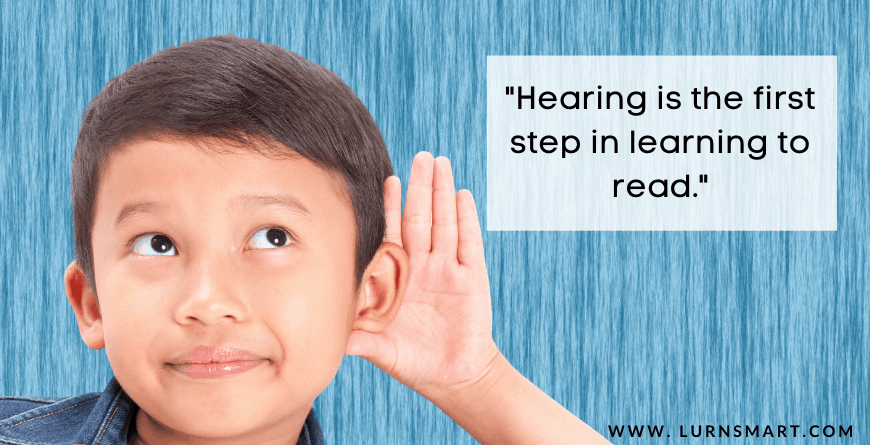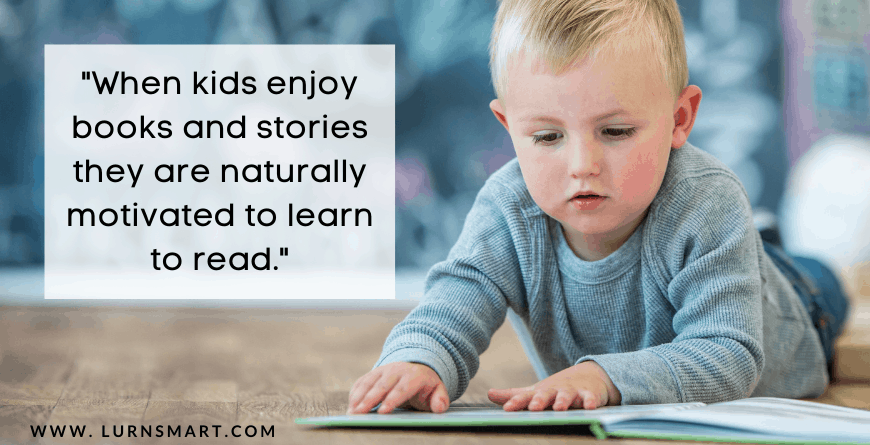6 Important Pre Reading Skills to Prepare Your Child for Reading Success
- Categories Early Learning, Reading
- Tags Reading time 5 min

Do you know that there are 6 important pre-reading skills that your child needs to develop in order to become a successful reader and speller?
Oftentimes, these pre-reading skills are ignored but research shows that the development of these skills is the very foundation on which all other literacy skills such as phonics, advanced spelling skills, and vocabulary are built.
Before we learn about each individual pre-reading skill and ways to help your child develop them easily, think of these skills as the foundation of a house.

We can build a house without a foundation, no problem!
But we all know that a house without a foundation would not be strong!
So what should we do to build a strong house?
Simple!
Lay a strong, solid foundation!
Similarly, to help your child become a confident reader and speller, it is important to build 6 foundational (pre-reading) skills first. Coz’ without those skills, chances are, your child might struggle to read and might not enjoy the whole ‘learning to read’ experience.
So remember…..
Strong foundational skills = confident and successful reader
6 Important Pre Reading Skills to Prepare Your Child for Reading Success:
Now that you have learned that the 6 pre-reading skills are foundational to your child’s reading success, let us learn about each of these skills and ways you can develop them easily.
1. SOUND AWARENESS:

The first and the most important pre-reading skill that your child needs to develop is ‘sound awareness’ also known as ‘phonemic awareness.’
We all know that when children first begin to speak, they don’t use words or speak in full sentences, right?
Instead, they begin with the sounds in the language!
All the cooing and babbling are nothing but a baby’s attempt to produce speech sounds in his or her native language.
I know, you must be aware of this already!
But what you might not know is…..
This awareness of sounds not only helps children learn to speak the language effortlessly but can also help them learn to read the language easily because, ‘sounds are the building blocks of words, both spoken and written.’
Here’s an example!
So remember…..
To learn more about how to develop your child’s sound awareness in English through fun games and activities, check out the below blog posts:
- Fun Phonemic Awareness Activities to Develop Sound Awareness Skills
- Easy Phonological Awareness Activities to Build Reading & Spelling Skills
If you are new to the sounds in English, then watch my video, the 44 Phonics Sounds in English.
2. PRINT MOTIVATION

When we enjoy something, we are naturally motivated to do MORE of it simply because it fills us up with joy, excitement, and happiness, right?
Well, the same is true with kids who enjoy books and stories because these kids are naturally motivated to learn to read.
But what if your child does not enjoy being read to?
If you are a parent who feels that irrespective of what you do, you simply can’t get your child to like books, then check out my post 12 Genius Ways to Create a Love for Reading Books in Kids.
3. PRINT AWARENESS:

Learning to read doesn’t happen overnight!
So before children learn to read, they should first learn some basic concepts such as…
- How to hold a book right.
- Learn that text is read from left to right.
- Understand that letters form words and words can be put together to convey a thought.
This might seem simple but children are not born knowing these concepts. And so, it is something that they need to learn eventually.
Research shows that learning these concepts happens easily and effortlessly when children are surrounded by print.
To learn how to develop your child’s print awareness easily, you can read my blog post 3 Powerful Tips to Promote Print Awareness + Print Awareness Checklist.
4. ALPHABET KNOWLEDGE:

Alphabet knowledge is the recognition of letters by their names, sounds, and shapes.
As Marilyn Jager Adams, cognitive and developmental psychologist, puts it, alphabet knowledge is “one of the best predictors for early reading success.”
Most children learn the letters of the alphabet before they even know what it is through the Alphabet Song. But once they are familiar with the letter names, it is important to help them associate letter names with their respective letter shapes!
And….. alphabet charts, alphabet stickers, alphabet books, alphabet puzzles, alphabet mats, and magnetic letters are some great tools that can help you get your child familiar with alphabet shapes!
By the way, if you are looking for more fun ways to teach the letters of the alphabet to your child, then check out my blog post 5 Interesting Activities to Teach the Letter Sounds + FREE Printables.
5. VOCABULARY:

We all know, that if a child knows a lot of words, the child is SMART!
But do you know that if a child knows a lot of words, it is easier to learn to read?
According to a report published by the National Reading Panel, for a child to achieve reading success, the child should first be able to understand what he or she reads.
But to understand what he or she reads, the child should first be familiar with the words and their meaning.
So remember…..
What is cool about having the motivation to read is that it results in the child learning more new words. It is like a cycle!
So if you want to learn interesting ways to help expand your child’s vocabulary, check out my blog post 12 Killer Ways to Build English Vocabulary for Kids.
6. COMPREHENSION:

Comprehension is the ability to understand what you read!
Oftentimes, parents including some educators believe that comprehension comes only after the child learns to read.
But this is so not true!
Let me ask you a question!
Would you have the motivation to continue with a task when you can’t make head or tail out of it?
No, right?
Likewise, children would not have the motivation to learn to read if they can’t make sense of what they read!
Hence, it’s essential to set the stage prior to helping children learn to read, so they have the motivation to keep reading.
You see, children are naturally curious. If they can understand that the story is about a little monkey who was lost in the forest, they will be curious to find out what happens to that little monkey. And this curiosity is what will eventually motivate them to learn to read!
If you want to learn more about how to develop your child’s comprehension skills, then check out my blog post 10 Effective Strategies to Improve Reading Comprehension for Kids.
As I mentioned earlier in this post, developing these 6 pre-reading skills—sound awareness, print motivation, print awareness, letter knowledge, vocabulary, and comprehension is foundational to your child’s reading success.
So starting today, focus on building these 6 foundational skills and set your child up for success!
Did you find this post, 6 Important Pre Reading Skills to Prepare Your Child for Reading Success useful?
If you did, then share this post with your friends!
Thanks in advance for doing so 😉
Final Notes:
If you are supporting your child to read at home, then you might want to read my blog post Teach Your Child to Read Using Phonics: The Ultimate 7-Step Guide for step-by-step instructions and all the necessary resources that you might need to help your child read and spell easily!
If you are looking for a kid’s reading program, I welcome you to join our LURN Phonics Kid’s Reading Program which is a step-by-step parent-led program that is designed to help your child read and spell fluently and efficiently!
To take up this program, you do not need any prior phonics knowledge or teaching experience!
Everything is so simplified for you that all you need is a playful attitude and the enthusiasm to set aside 10-15 minutes a day to teach your child to read!
The best part is, our reading program is multisensorial and fun-based so no more tears while learning to read but lots of fun and play!
So go ahead and check out our LURN Phonics Kid’s Reading Program and I cannot wait to help you help your little one become an amazing reader and speller 🙂
You may also like




